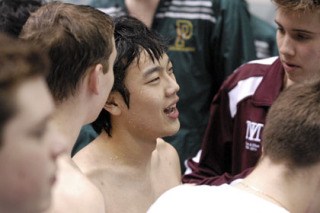A two-day marathon took place for Mercer Island High School senior Inar Zhang two weekends ago. He participated in the state swim meet where the Islanders captured a fourth straight title, while also participating in a mock trial district competition. A fairly standard weekend for a student who says this is “taking it easy.”
Zhang not only participates in a myriad of activities at the high school, but he was recently selected as one of four students in the nation for the 2009 Neuroscience Research Prize, based on research that he has done at the University of Washington on the role of a gene in developmental dyslexia.
The award, given by the American Academy of Neurology (AAN) and the Child Neurology Society, will be presented to Zhang next fall during the annual Child Neurology Society meeting in Louisville, Ky. He will present his research during the meeting and received a $1,000 scholarship.
“It’s really an honor. It follows the hard work I’ve put in. Honestly, the data and getting published is what’s really important,” he said.
For Zhang, the real excitement comes from doing labs and learning things that were previously unknown about the brain. Zhang said that he first got interested during his freshman year, wanting to learn more outside of his regular science classes, but found it difficult to connect with professors at the college, mostly due to his age. He spent his sophomore year reading research papers, so the next summer when he went back to the UW, asking to work in the lab, he could talk about specific projects and research.
Zhang might not have ever found out that he won the award, if not for one of his high school teachers who informed him. The e-mail detailing his achievement had gone straight to his junk mail.
“It was very exciting,” Zhang said of learning that he had won. “It’s exciting because it’s a specific award given by specialists.”
To be eligible for the prize, students must be in high school with original research work in the field of neurology. The research must deal with investigating a problem in the brain or nervous system relating to anatomy, physiology, pathology, function or behavior. Judges looked at the originality of the approach to the research and examined whether the hypothesis and methodology of the project were feasible. Submissions needed to include a written report, and entrants had to be able to discuss and defend their conclusions during an interview with the judges.
The most difficult portion of the process for Zhang was the interview because the judges were specialists who grilled him on his research.
“That was difficult,” said Zhang. But as he pointed out, all in all, it must have gone well because he was a finalist.
“Inar is an exceptionally talented and motivated student,” said Larry Bencivengo, a science teacher at MIHS. “He has already been listed as a co-author on two published scientific papers, and he hasn’t even graduated from high school yet. He seems destined for a spectacular career as a scientist.”
Zhang said that his interest in neurology stems from personal family history.
“It definitely influenced me,” said Zhang of the family history, adding it was a beginning, not an all-consuming issue.
The more he researches, the more he is amazed about what is not yet known. After having been around the block and gaining experience, it is the unknowns that are pushing him to learn more.
“There are so many things we don’t know. With amyotrophic lateral sclerosis (ALS), it’s unbelievable what we don’t know. I guess it’s a little absurd, considering how much has been spent on research. There’s a saying that the more we learn about the brain, the more the brain learns.”
Three of the four winners earned trips to the AAN annual meeting in Seattle, where they will present their findings, while the fourth earned a trip to the Child Neurology Society meeting in Kentucky in October. Zhang said the prospect of presenting information to this group is intimidating, but something he is excited to do.
“I’m very, very nervous,” he said of the trip. “It’s a very frightening experience because they are the authority with experience, and you’ve got to go and try and tell them what you’ve done. The good thing is, they know how old I am, and I have time to prepare for it.”
Zhang recently gave a lecture at Seattle Pacific University about his research, citing it as a great way to prepare for the conference. He said that he would like to pursue research as an undergraduate in college, and maybe follow it as a career, but his options are wide open. His other interests include his economics class at the high school because it uses the scientific process, but also for the way it integrates politics and other disciplines.
“I’m pretty focused in my interests,” he said. “But it can be very difficult to balance everything. There have been some sleepless nights.” The senior was accepted early to Yale, but said he is waiting to hear back from Duke University before making a final decision about where he will head this fall.
As his high school career draws to a close, Zhang said that he hopes to take it easy this semester, focusing on spending time with friends, going to concerts and finishing up his school work.
“It may not seem like it, but I’m trying to take it easy right now. This is the last time to not hold such high academic demands for myself,” said Zhang.



